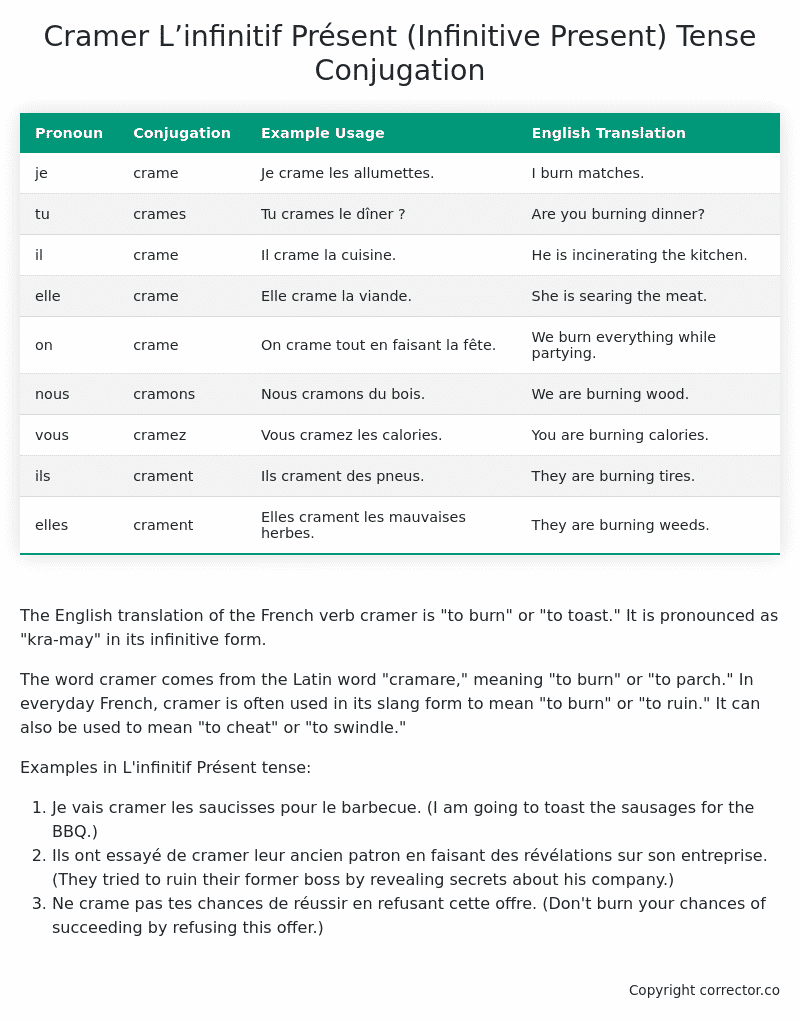L’infinitif Présent (Infinitive Present) Tense Conjugation of the French Verb cramer
Introduction to the verb cramer
The English translation of the French verb cramer is “to burn” or “to toast.” It is pronounced as “kra-may” in its infinitive form.
The word cramer comes from the Latin word “cramare,” meaning “to burn” or “to parch.” In everyday French, cramer is often used in its slang form to mean “to burn” or “to ruin.” It can also be used to mean “to cheat” or “to swindle.”
Examples in L’infinitif Présent tense:
- Je vais cramer les saucisses pour le barbecue. (I am going to toast the sausages for the BBQ.)
- Ils ont essayé de cramer leur ancien patron en faisant des révélations sur son entreprise. (They tried to ruin their former boss by revealing secrets about his company.)
- Ne crame pas tes chances de réussir en refusant cette offre. (Don’t burn your chances of succeeding by refusing this offer.)
Table of the L’infinitif Présent (Infinitive Present) Tense Conjugation of cramer
| Pronoun | Conjugation | Example Usage | English Translation |
|---|---|---|---|
| je | crame | Je crame les allumettes. | I burn matches. |
| tu | crames | Tu crames le dîner ? | Are you burning dinner? |
| il | crame | Il crame la cuisine. | He is incinerating the kitchen. |
| elle | crame | Elle crame la viande. | She is searing the meat. |
| on | crame | On crame tout en faisant la fête. | We burn everything while partying. |
| nous | cramons | Nous cramons du bois. | We are burning wood. |
| vous | cramez | Vous cramez les calories. | You are burning calories. |
| ils | crament | Ils crament des pneus. | They are burning tires. |
| elles | crament | Elles crament les mauvaises herbes. | They are burning weeds. |
Other Conjugations for Cramer.
Le Present (Present Tense) Conjugation of the French Verb cramer
Imparfait (Imperfect) Tense Conjugation of the French Verb cramer
Passé Simple (Simple Past) Tense Conjugation of the French Verb cramer
Passé Composé (Present Perfect) Tense Conjugation of the French Verb cramer
Futur Simple (Simple Future) Tense Conjugation of the French Verb cramer
Futur Proche (Near Future) Tense Conjugation of the French Verb cramer
Plus-que-parfait (Pluperfect) Tense Conjugation of the French Verb cramer
Passé Antérieur (Past Anterior) Tense Conjugation of the French Verb cramer
Futur Antérieur (Future Anterior) Tense Conjugation of the French Verb cramer
Subjonctif Présent (Subjunctive Present) Tense Conjugation of the French Verb cramer
Subjonctif Passé (Subjunctive Past) Tense Conjugation of the French Verb cramer
Subjonctif Imparfait (Subjunctive Imperfect) Tense Conjugation of the French Verb cramer
Subjonctif Plus-que-parfait (Subjunctive Pluperfect) Tense Conjugation of the French Verb cramer
Conditionnel Présent (Conditional Present) Tense Conjugation of the French Verb cramer
Conditionnel Passé (Conditional Past) Tense Conjugation of the French Verb cramer
L’impératif Présent (Imperative Present) Tense Conjugation of the French Verb cramer
L’infinitif Présent (Infinitive Present) Tense Conjugation of the French Verb cramer (this article)
Struggling with French verbs or the language in general? Why not use our free French Grammar Checker – no registration required!
Get a FREE Download Study Sheet of this Conjugation 🔥
Simply right click the image below, click “save image” and get your free reference for the cramer L’infinitif Présent tense conjugation!

Cramer – About the French L’infinitif Présent (Infinitive Present) Tense
Forming the Infinitive Present
Common Everyday Usage Patterns
As a Verb’s Dictionary Form
After Modal Verbs
As an Imperative
In Infinitive Clauses
Interactions with Other Tenses
Present Tense
Future Tense
Conditional Tense
Passé Composé
Imperfect Tense
Subjunctive and Conditional Moods
Summary
Want More?
I hope you enjoyed this article on the verb cramer. Still in a learning mood? Check out another TOTALLY random French verb conjugation!


